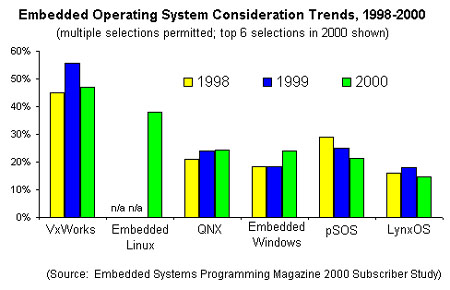Wind River answers Linux challenge with BSDi acquisition
Apr 4, 2001 — by Rick Lehrbaum — from the LinuxDevices Archive — viewsRick Lehrbaum writes . . .
In a stunning manifestation of just how much impact Linux has had on the embedded software market, market leader Wind River Systems Inc. today announced its plan to acquire the software assets of Berkeley Software Design Inc. (BSDi). Those assets include BSD/OS, BSDi's commercial version of BSD UNIX, and related development tools. BSDi was the first commercial supplier of BSD UNIX, one of the most popular operating systems for Web servers and other Internet infrastructure systems. Following the asset transfer, BSDi will change its name to iXsystems Inc. and will thereafter focus its resources on its server systems business. Financial details of the transaction, which is expected to close by the end of this month, have not been disclosed.
In addition to acquiring the commercial version of BSD UNIX, Wind River also says it will support the FreeBSD open source project, in order to advance the standing of its newly acquired technologies. Wind River is the leading supplier of commercial operating systems used in embedded systems, holding greater than 50% share of what is purported to be a $2B+ market.
In recent years, Wind River has seen the popularity of its VxWorks OS diminish, while that of Linux has mushroomed. According to the Embedded Systems Programming Magazine 2000 Subscriber Study, interest in using Wind River's VxWorks operating system in embedded system applications grew from 45% to 56% between 1998 and 1999, but diminished to 47% in 2000. During that same period, interest in Embedded Linux exploded — jumping from virtually nil in 1998 and 1999, to the number two spot (38%) in 2000, second only to Wind River's VxWorks.

“business-friendly” license?
Over the past year, Wind River has increasingly commented on the embedded market's growing fondness for open source software and, especially, Linux. Those comments have indicated an interest in supporting open source software, and also a questioning of its most common licensing models. Recently, one of Wind River's VPs reportedly asserted that the GNU General Public License, (GPL) under which Linux and most of its supporting software are released, represents a serious problem relative to use in embedded system applications.
Here are a few comments made by Wind River executives about Linux and open source software . . .
- In a public debate on open source software at the March 2000 Embedded Systems Conference, Wind River's VP of Technology, John Fogelin, said “We embrace open source and are evaluating Linux as an OS option for Wind River customers. We are prototyping solutions based on Linux, now.”
- In a March, 2000 interview, Wind River's founder and chairman, Jerry Fiddler, told LinuxDevices.com “we announced that . . . Tornado [Wind River's OS development tool] will support Linux hosted development, but our interest isn't limited to the development environment only . . . We are prototyping Linux based [target] solutions right now.”
- In another public debate on open source software held at the Embedded Systems Conference in September 2000, Fogelin commented that “from the development perspective, there is the question of licensing — there's GPL, BSD, etc. licensing . . . I think there are some real issues regarding what type of licensing you want to use.”
- Mike Downing of Integrated Communications Design recently reported on a statement by Wind River's Vice President of Corporate Marketing, Curt Schacker, in which Schacker expressed concerns about the viability of using Linux and other GPL software in embedded applications. According to Downing, Schacker said “More customers are telling us that they see interesting aspects to Linux . . . but we're seeing a growing problem due to the growing uncertainty of using GPL-based code in embedded development.”
Wind River's attitude on FreeBSD
According to today's announcement, Wind River intends to continue to support the efforts of FreeBSD open-source software, working closely with the open-source developers. Wind River will provide operational and technical support, marketing, and funding for FreeBSD, and will continue to distribute the software free of charge through ftp.FreeBSD.org (“the world's busiest FTP server”) and as a shrink-wrap software product through retail outlets. In addition, technical innovations from Wind River's commercial BSD/OS will be used to advance the FreeBSD version, as well as to develop new products for the FreeBSD Project.
Commenting on Wind River's expression of support for FreeBSD, BSDi's VP of open-source technology and chief evangelist, Jordan Hubbard, said “Wind River believes in the importance of collaborative efforts such as FreeBSD. Wind River's commitment is evident by the willingness to put financial, technical, and marketing support behind the FreeBSD Project. I look forward to continuing my efforts to develop and strengthen FreeBSD's position, as well as help facilitate ongoing innovative development and promotional efforts over the long term.”
Wind River has made it clear that they intend to support — and hope to gain the support of — the BSD open source developer community. But the question certainly remains: How warmly will FreeBSD developers welcome the potential dominance of BSD UNIX by the world's leading proprietary embedded OS vendor?
This article was originally published on LinuxDevices.com and has been donated to the open source community by QuinStreet Inc. Please visit LinuxToday.com for up-to-date news and articles about Linux and open source.